Analysis of the Business Environment for Iceland Supermarket
VerifiedAdded on 2020/02/03
|13
|4352
|164
Report
AI Summary
This report provides a comprehensive analysis of the business environment affecting Iceland Supermarket. It begins by outlining the company's purpose and responsibilities, comparing it to competitors like KFC, Transport for London, and Cancer Research. The report then examines stakeholder relationships, detailing the expectations of employees, customers, shareholders, and suppliers. Task 2 delves into how different economic systems, including command, mixed, free enterprise, and traditional systems, allocate resources and impact Iceland Supermarket. It further explores the effects of fiscal and monetary policies, as well as competition policies and other regulatory mechanisms. Task 3 analyzes how market structures determine pricing and output decisions, and how market forces and the business and cultural environments shape Iceland Supermarket's behavior. Finally, Task 4 assesses the significance of international trade, the impact of global factors, and the influence of EU policies on the supermarket chain. The report concludes by summarizing the key findings and implications for Iceland Supermarket's operations and strategic planning.
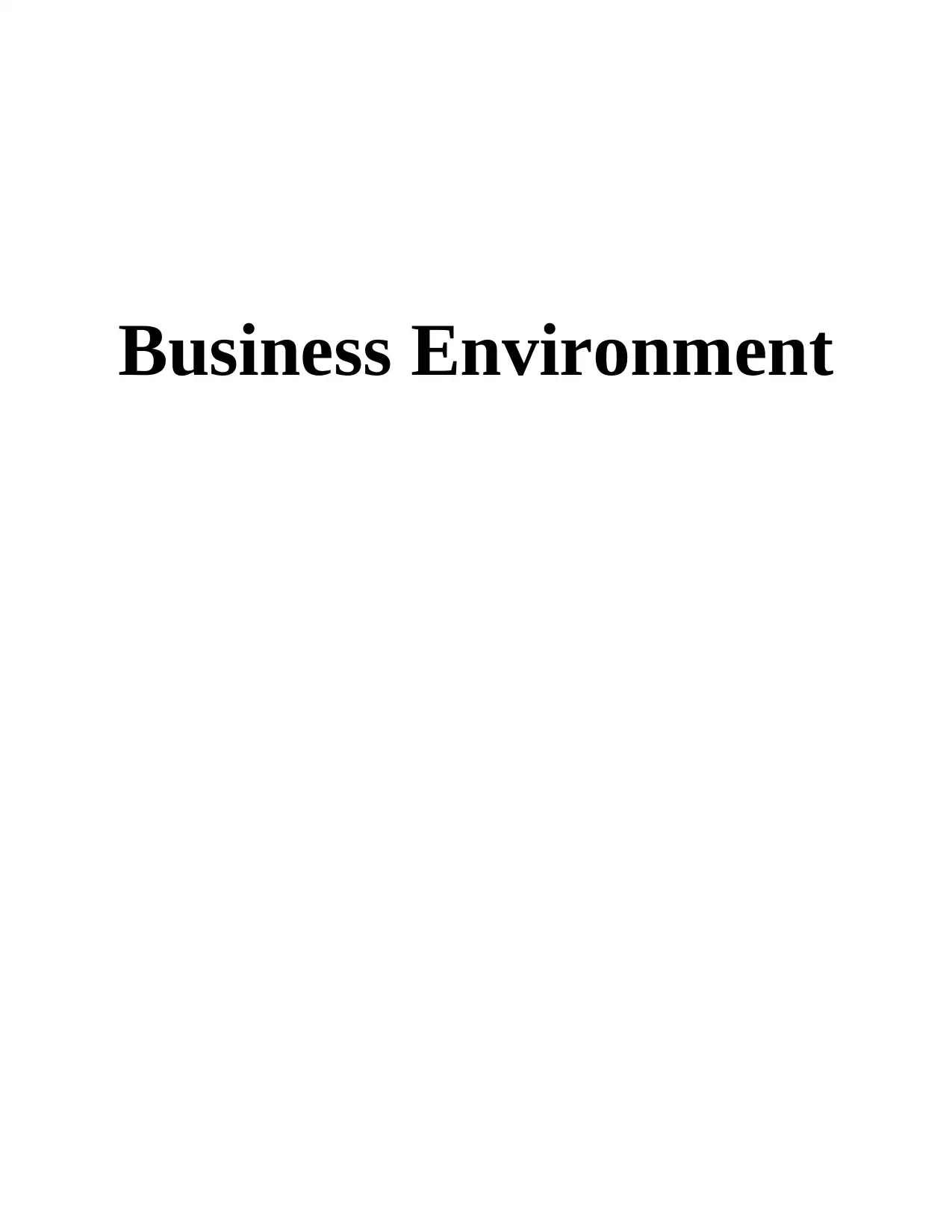
Business Environment
Paraphrase This Document
Need a fresh take? Get an instant paraphrase of this document with our AI Paraphraser
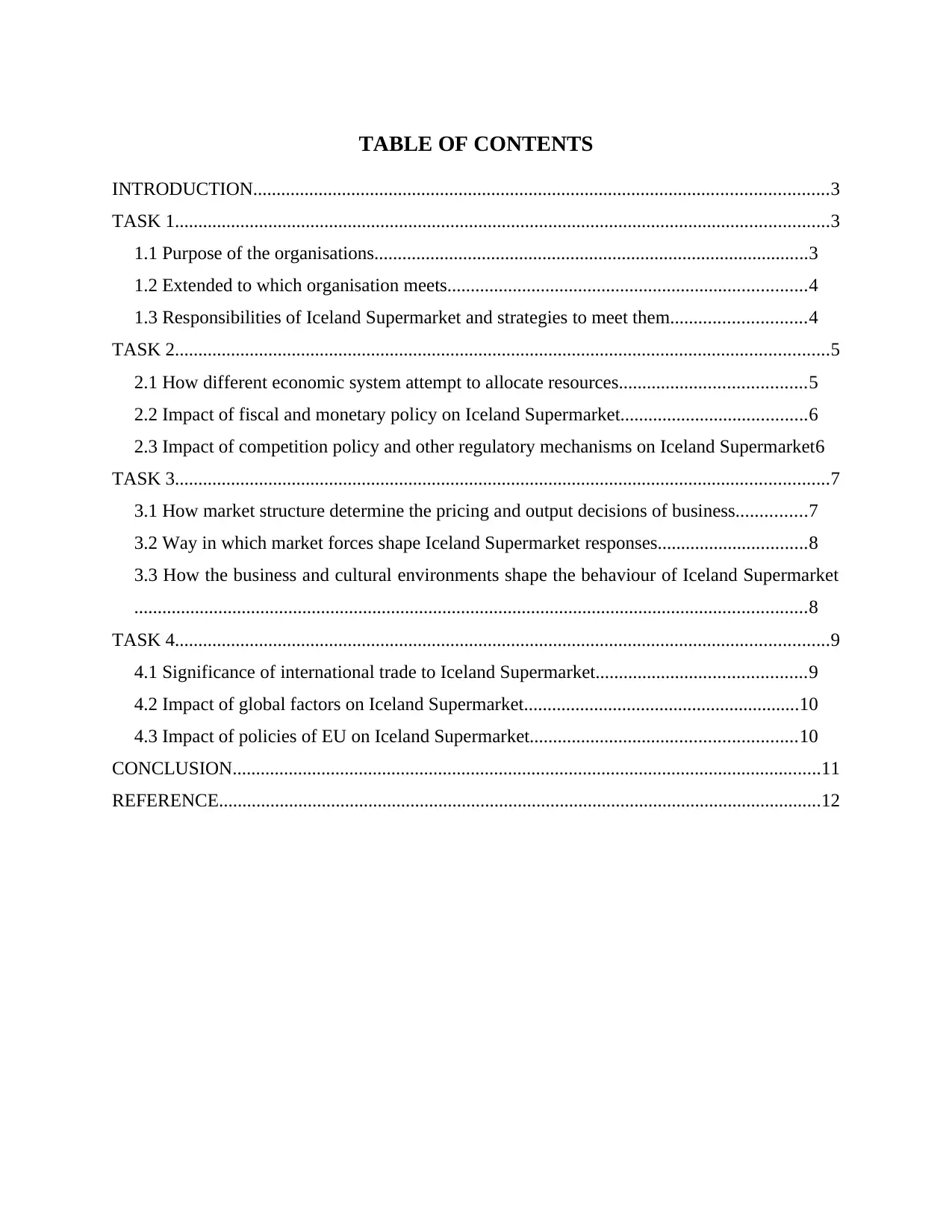
TABLE OF CONTENTS
INTRODUCTION...........................................................................................................................3
TASK 1............................................................................................................................................3
1.1 Purpose of the organisations.............................................................................................3
1.2 Extended to which organisation meets.............................................................................4
1.3 Responsibilities of Iceland Supermarket and strategies to meet them.............................4
TASK 2............................................................................................................................................5
2.1 How different economic system attempt to allocate resources........................................5
2.2 Impact of fiscal and monetary policy on Iceland Supermarket........................................6
2.3 Impact of competition policy and other regulatory mechanisms on Iceland Supermarket6
TASK 3............................................................................................................................................7
3.1 How market structure determine the pricing and output decisions of business...............7
3.2 Way in which market forces shape Iceland Supermarket responses................................8
3.3 How the business and cultural environments shape the behaviour of Iceland Supermarket
................................................................................................................................................8
TASK 4............................................................................................................................................9
4.1 Significance of international trade to Iceland Supermarket.............................................9
4.2 Impact of global factors on Iceland Supermarket...........................................................10
4.3 Impact of policies of EU on Iceland Supermarket.........................................................10
CONCLUSION..............................................................................................................................11
REFERENCE.................................................................................................................................12
INTRODUCTION...........................................................................................................................3
TASK 1............................................................................................................................................3
1.1 Purpose of the organisations.............................................................................................3
1.2 Extended to which organisation meets.............................................................................4
1.3 Responsibilities of Iceland Supermarket and strategies to meet them.............................4
TASK 2............................................................................................................................................5
2.1 How different economic system attempt to allocate resources........................................5
2.2 Impact of fiscal and monetary policy on Iceland Supermarket........................................6
2.3 Impact of competition policy and other regulatory mechanisms on Iceland Supermarket6
TASK 3............................................................................................................................................7
3.1 How market structure determine the pricing and output decisions of business...............7
3.2 Way in which market forces shape Iceland Supermarket responses................................8
3.3 How the business and cultural environments shape the behaviour of Iceland Supermarket
................................................................................................................................................8
TASK 4............................................................................................................................................9
4.1 Significance of international trade to Iceland Supermarket.............................................9
4.2 Impact of global factors on Iceland Supermarket...........................................................10
4.3 Impact of policies of EU on Iceland Supermarket.........................................................10
CONCLUSION..............................................................................................................................11
REFERENCE.................................................................................................................................12
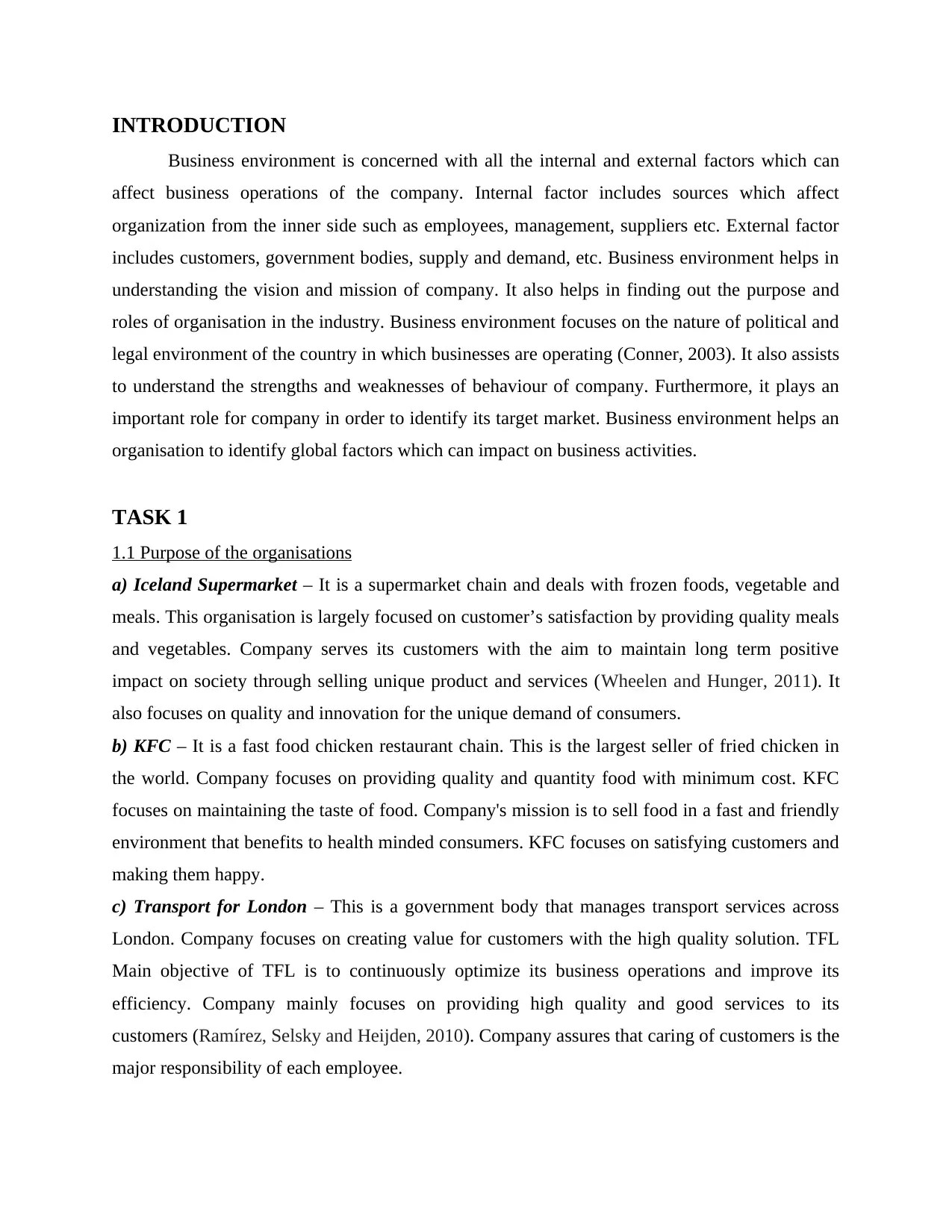
INTRODUCTION
Business environment is concerned with all the internal and external factors which can
affect business operations of the company. Internal factor includes sources which affect
organization from the inner side such as employees, management, suppliers etc. External factor
includes customers, government bodies, supply and demand, etc. Business environment helps in
understanding the vision and mission of company. It also helps in finding out the purpose and
roles of organisation in the industry. Business environment focuses on the nature of political and
legal environment of the country in which businesses are operating (Conner, 2003). It also assists
to understand the strengths and weaknesses of behaviour of company. Furthermore, it plays an
important role for company in order to identify its target market. Business environment helps an
organisation to identify global factors which can impact on business activities.
TASK 1
1.1 Purpose of the organisations
a) Iceland Supermarket – It is a supermarket chain and deals with frozen foods, vegetable and
meals. This organisation is largely focused on customer’s satisfaction by providing quality meals
and vegetables. Company serves its customers with the aim to maintain long term positive
impact on society through selling unique product and services (Wheelen and Hunger, 2011). It
also focuses on quality and innovation for the unique demand of consumers.
b) KFC – It is a fast food chicken restaurant chain. This is the largest seller of fried chicken in
the world. Company focuses on providing quality and quantity food with minimum cost. KFC
focuses on maintaining the taste of food. Company's mission is to sell food in a fast and friendly
environment that benefits to health minded consumers. KFC focuses on satisfying customers and
making them happy.
c) Transport for London – This is a government body that manages transport services across
London. Company focuses on creating value for customers with the high quality solution. TFL
Main objective of TFL is to continuously optimize its business operations and improve its
efficiency. Company mainly focuses on providing high quality and good services to its
customers (Ramírez, Selsky and Heijden, 2010). Company assures that caring of customers is the
major responsibility of each employee.
Business environment is concerned with all the internal and external factors which can
affect business operations of the company. Internal factor includes sources which affect
organization from the inner side such as employees, management, suppliers etc. External factor
includes customers, government bodies, supply and demand, etc. Business environment helps in
understanding the vision and mission of company. It also helps in finding out the purpose and
roles of organisation in the industry. Business environment focuses on the nature of political and
legal environment of the country in which businesses are operating (Conner, 2003). It also assists
to understand the strengths and weaknesses of behaviour of company. Furthermore, it plays an
important role for company in order to identify its target market. Business environment helps an
organisation to identify global factors which can impact on business activities.
TASK 1
1.1 Purpose of the organisations
a) Iceland Supermarket – It is a supermarket chain and deals with frozen foods, vegetable and
meals. This organisation is largely focused on customer’s satisfaction by providing quality meals
and vegetables. Company serves its customers with the aim to maintain long term positive
impact on society through selling unique product and services (Wheelen and Hunger, 2011). It
also focuses on quality and innovation for the unique demand of consumers.
b) KFC – It is a fast food chicken restaurant chain. This is the largest seller of fried chicken in
the world. Company focuses on providing quality and quantity food with minimum cost. KFC
focuses on maintaining the taste of food. Company's mission is to sell food in a fast and friendly
environment that benefits to health minded consumers. KFC focuses on satisfying customers and
making them happy.
c) Transport for London – This is a government body that manages transport services across
London. Company focuses on creating value for customers with the high quality solution. TFL
Main objective of TFL is to continuously optimize its business operations and improve its
efficiency. Company mainly focuses on providing high quality and good services to its
customers (Ramírez, Selsky and Heijden, 2010). Company assures that caring of customers is the
major responsibility of each employee.
⊘ This is a preview!⊘
Do you want full access?
Subscribe today to unlock all pages.

Trusted by 1+ million students worldwide
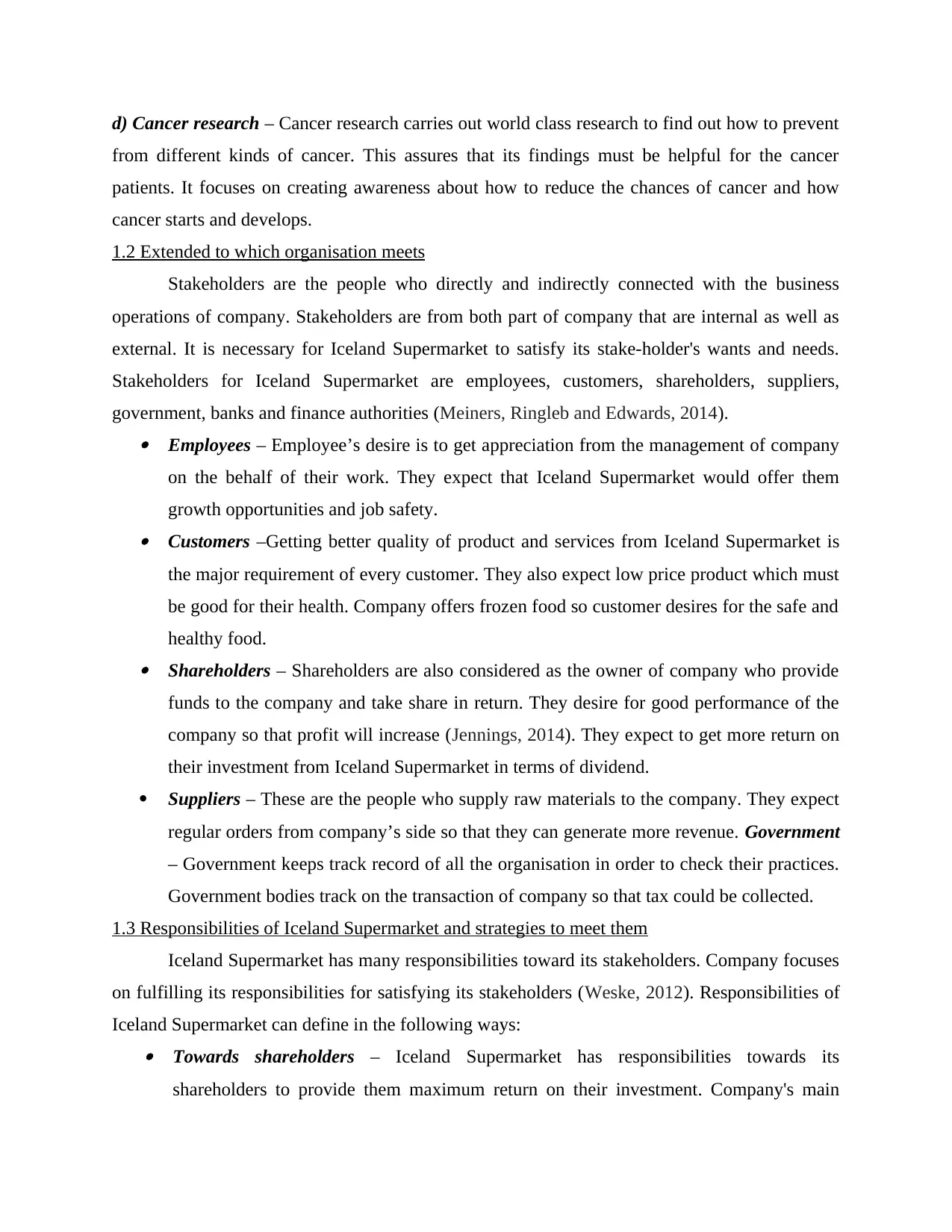
d) Cancer research – Cancer research carries out world class research to find out how to prevent
from different kinds of cancer. This assures that its findings must be helpful for the cancer
patients. It focuses on creating awareness about how to reduce the chances of cancer and how
cancer starts and develops.
1.2 Extended to which organisation meets
Stakeholders are the people who directly and indirectly connected with the business
operations of company. Stakeholders are from both part of company that are internal as well as
external. It is necessary for Iceland Supermarket to satisfy its stake-holder's wants and needs.
Stakeholders for Iceland Supermarket are employees, customers, shareholders, suppliers,
government, banks and finance authorities (Meiners, Ringleb and Edwards, 2014). Employees – Employee’s desire is to get appreciation from the management of company
on the behalf of their work. They expect that Iceland Supermarket would offer them
growth opportunities and job safety. Customers –Getting better quality of product and services from Iceland Supermarket is
the major requirement of every customer. They also expect low price product which must
be good for their health. Company offers frozen food so customer desires for the safe and
healthy food. Shareholders – Shareholders are also considered as the owner of company who provide
funds to the company and take share in return. They desire for good performance of the
company so that profit will increase (Jennings, 2014). They expect to get more return on
their investment from Iceland Supermarket in terms of dividend.
Suppliers – These are the people who supply raw materials to the company. They expect
regular orders from company’s side so that they can generate more revenue. Government
– Government keeps track record of all the organisation in order to check their practices.
Government bodies track on the transaction of company so that tax could be collected.
1.3 Responsibilities of Iceland Supermarket and strategies to meet them
Iceland Supermarket has many responsibilities toward its stakeholders. Company focuses
on fulfilling its responsibilities for satisfying its stakeholders (Weske, 2012). Responsibilities of
Iceland Supermarket can define in the following ways: Towards shareholders – Iceland Supermarket has responsibilities towards its
shareholders to provide them maximum return on their investment. Company's main
from different kinds of cancer. This assures that its findings must be helpful for the cancer
patients. It focuses on creating awareness about how to reduce the chances of cancer and how
cancer starts and develops.
1.2 Extended to which organisation meets
Stakeholders are the people who directly and indirectly connected with the business
operations of company. Stakeholders are from both part of company that are internal as well as
external. It is necessary for Iceland Supermarket to satisfy its stake-holder's wants and needs.
Stakeholders for Iceland Supermarket are employees, customers, shareholders, suppliers,
government, banks and finance authorities (Meiners, Ringleb and Edwards, 2014). Employees – Employee’s desire is to get appreciation from the management of company
on the behalf of their work. They expect that Iceland Supermarket would offer them
growth opportunities and job safety. Customers –Getting better quality of product and services from Iceland Supermarket is
the major requirement of every customer. They also expect low price product which must
be good for their health. Company offers frozen food so customer desires for the safe and
healthy food. Shareholders – Shareholders are also considered as the owner of company who provide
funds to the company and take share in return. They desire for good performance of the
company so that profit will increase (Jennings, 2014). They expect to get more return on
their investment from Iceland Supermarket in terms of dividend.
Suppliers – These are the people who supply raw materials to the company. They expect
regular orders from company’s side so that they can generate more revenue. Government
– Government keeps track record of all the organisation in order to check their practices.
Government bodies track on the transaction of company so that tax could be collected.
1.3 Responsibilities of Iceland Supermarket and strategies to meet them
Iceland Supermarket has many responsibilities toward its stakeholders. Company focuses
on fulfilling its responsibilities for satisfying its stakeholders (Weske, 2012). Responsibilities of
Iceland Supermarket can define in the following ways: Towards shareholders – Iceland Supermarket has responsibilities towards its
shareholders to provide them maximum return on their investment. Company's main
Paraphrase This Document
Need a fresh take? Get an instant paraphrase of this document with our AI Paraphraser
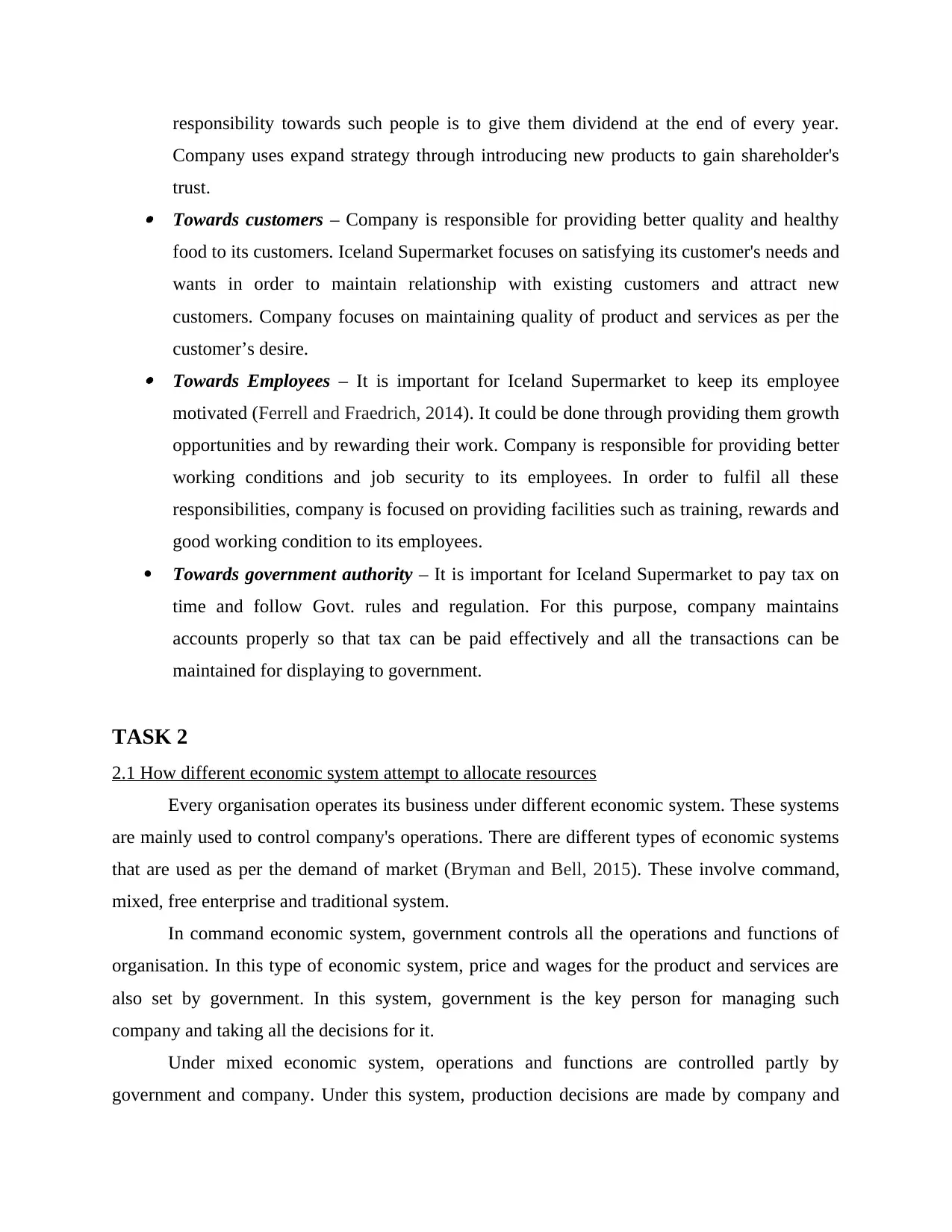
responsibility towards such people is to give them dividend at the end of every year.
Company uses expand strategy through introducing new products to gain shareholder's
trust. Towards customers – Company is responsible for providing better quality and healthy
food to its customers. Iceland Supermarket focuses on satisfying its customer's needs and
wants in order to maintain relationship with existing customers and attract new
customers. Company focuses on maintaining quality of product and services as per the
customer’s desire. Towards Employees – It is important for Iceland Supermarket to keep its employee
motivated (Ferrell and Fraedrich, 2014). It could be done through providing them growth
opportunities and by rewarding their work. Company is responsible for providing better
working conditions and job security to its employees. In order to fulfil all these
responsibilities, company is focused on providing facilities such as training, rewards and
good working condition to its employees.
Towards government authority – It is important for Iceland Supermarket to pay tax on
time and follow Govt. rules and regulation. For this purpose, company maintains
accounts properly so that tax can be paid effectively and all the transactions can be
maintained for displaying to government.
TASK 2
2.1 How different economic system attempt to allocate resources
Every organisation operates its business under different economic system. These systems
are mainly used to control company's operations. There are different types of economic systems
that are used as per the demand of market (Bryman and Bell, 2015). These involve command,
mixed, free enterprise and traditional system.
In command economic system, government controls all the operations and functions of
organisation. In this type of economic system, price and wages for the product and services are
also set by government. In this system, government is the key person for managing such
company and taking all the decisions for it.
Under mixed economic system, operations and functions are controlled partly by
government and company. Under this system, production decisions are made by company and
Company uses expand strategy through introducing new products to gain shareholder's
trust. Towards customers – Company is responsible for providing better quality and healthy
food to its customers. Iceland Supermarket focuses on satisfying its customer's needs and
wants in order to maintain relationship with existing customers and attract new
customers. Company focuses on maintaining quality of product and services as per the
customer’s desire. Towards Employees – It is important for Iceland Supermarket to keep its employee
motivated (Ferrell and Fraedrich, 2014). It could be done through providing them growth
opportunities and by rewarding their work. Company is responsible for providing better
working conditions and job security to its employees. In order to fulfil all these
responsibilities, company is focused on providing facilities such as training, rewards and
good working condition to its employees.
Towards government authority – It is important for Iceland Supermarket to pay tax on
time and follow Govt. rules and regulation. For this purpose, company maintains
accounts properly so that tax can be paid effectively and all the transactions can be
maintained for displaying to government.
TASK 2
2.1 How different economic system attempt to allocate resources
Every organisation operates its business under different economic system. These systems
are mainly used to control company's operations. There are different types of economic systems
that are used as per the demand of market (Bryman and Bell, 2015). These involve command,
mixed, free enterprise and traditional system.
In command economic system, government controls all the operations and functions of
organisation. In this type of economic system, price and wages for the product and services are
also set by government. In this system, government is the key person for managing such
company and taking all the decisions for it.
Under mixed economic system, operations and functions are controlled partly by
government and company. Under this system, production decisions are made by company and
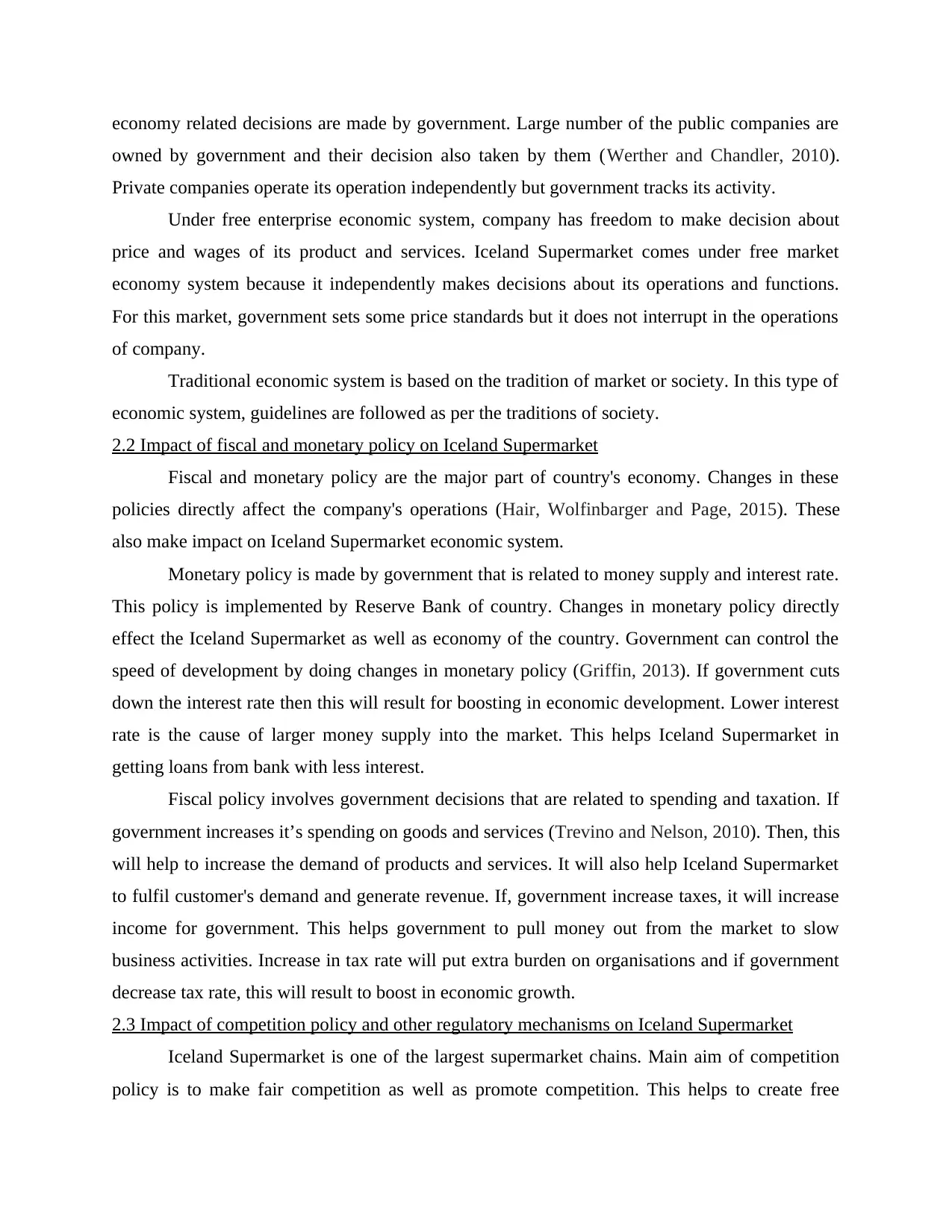
economy related decisions are made by government. Large number of the public companies are
owned by government and their decision also taken by them (Werther and Chandler, 2010).
Private companies operate its operation independently but government tracks its activity.
Under free enterprise economic system, company has freedom to make decision about
price and wages of its product and services. Iceland Supermarket comes under free market
economy system because it independently makes decisions about its operations and functions.
For this market, government sets some price standards but it does not interrupt in the operations
of company.
Traditional economic system is based on the tradition of market or society. In this type of
economic system, guidelines are followed as per the traditions of society.
2.2 Impact of fiscal and monetary policy on Iceland Supermarket
Fiscal and monetary policy are the major part of country's economy. Changes in these
policies directly affect the company's operations (Hair, Wolfinbarger and Page, 2015). These
also make impact on Iceland Supermarket economic system.
Monetary policy is made by government that is related to money supply and interest rate.
This policy is implemented by Reserve Bank of country. Changes in monetary policy directly
effect the Iceland Supermarket as well as economy of the country. Government can control the
speed of development by doing changes in monetary policy (Griffin, 2013). If government cuts
down the interest rate then this will result for boosting in economic development. Lower interest
rate is the cause of larger money supply into the market. This helps Iceland Supermarket in
getting loans from bank with less interest.
Fiscal policy involves government decisions that are related to spending and taxation. If
government increases it’s spending on goods and services (Trevino and Nelson, 2010). Then, this
will help to increase the demand of products and services. It will also help Iceland Supermarket
to fulfil customer's demand and generate revenue. If, government increase taxes, it will increase
income for government. This helps government to pull money out from the market to slow
business activities. Increase in tax rate will put extra burden on organisations and if government
decrease tax rate, this will result to boost in economic growth.
2.3 Impact of competition policy and other regulatory mechanisms on Iceland Supermarket
Iceland Supermarket is one of the largest supermarket chains. Main aim of competition
policy is to make fair competition as well as promote competition. This helps to create free
owned by government and their decision also taken by them (Werther and Chandler, 2010).
Private companies operate its operation independently but government tracks its activity.
Under free enterprise economic system, company has freedom to make decision about
price and wages of its product and services. Iceland Supermarket comes under free market
economy system because it independently makes decisions about its operations and functions.
For this market, government sets some price standards but it does not interrupt in the operations
of company.
Traditional economic system is based on the tradition of market or society. In this type of
economic system, guidelines are followed as per the traditions of society.
2.2 Impact of fiscal and monetary policy on Iceland Supermarket
Fiscal and monetary policy are the major part of country's economy. Changes in these
policies directly affect the company's operations (Hair, Wolfinbarger and Page, 2015). These
also make impact on Iceland Supermarket economic system.
Monetary policy is made by government that is related to money supply and interest rate.
This policy is implemented by Reserve Bank of country. Changes in monetary policy directly
effect the Iceland Supermarket as well as economy of the country. Government can control the
speed of development by doing changes in monetary policy (Griffin, 2013). If government cuts
down the interest rate then this will result for boosting in economic development. Lower interest
rate is the cause of larger money supply into the market. This helps Iceland Supermarket in
getting loans from bank with less interest.
Fiscal policy involves government decisions that are related to spending and taxation. If
government increases it’s spending on goods and services (Trevino and Nelson, 2010). Then, this
will help to increase the demand of products and services. It will also help Iceland Supermarket
to fulfil customer's demand and generate revenue. If, government increase taxes, it will increase
income for government. This helps government to pull money out from the market to slow
business activities. Increase in tax rate will put extra burden on organisations and if government
decrease tax rate, this will result to boost in economic growth.
2.3 Impact of competition policy and other regulatory mechanisms on Iceland Supermarket
Iceland Supermarket is one of the largest supermarket chains. Main aim of competition
policy is to make fair competition as well as promote competition. This helps to create free
⊘ This is a preview!⊘
Do you want full access?
Subscribe today to unlock all pages.

Trusted by 1+ million students worldwide
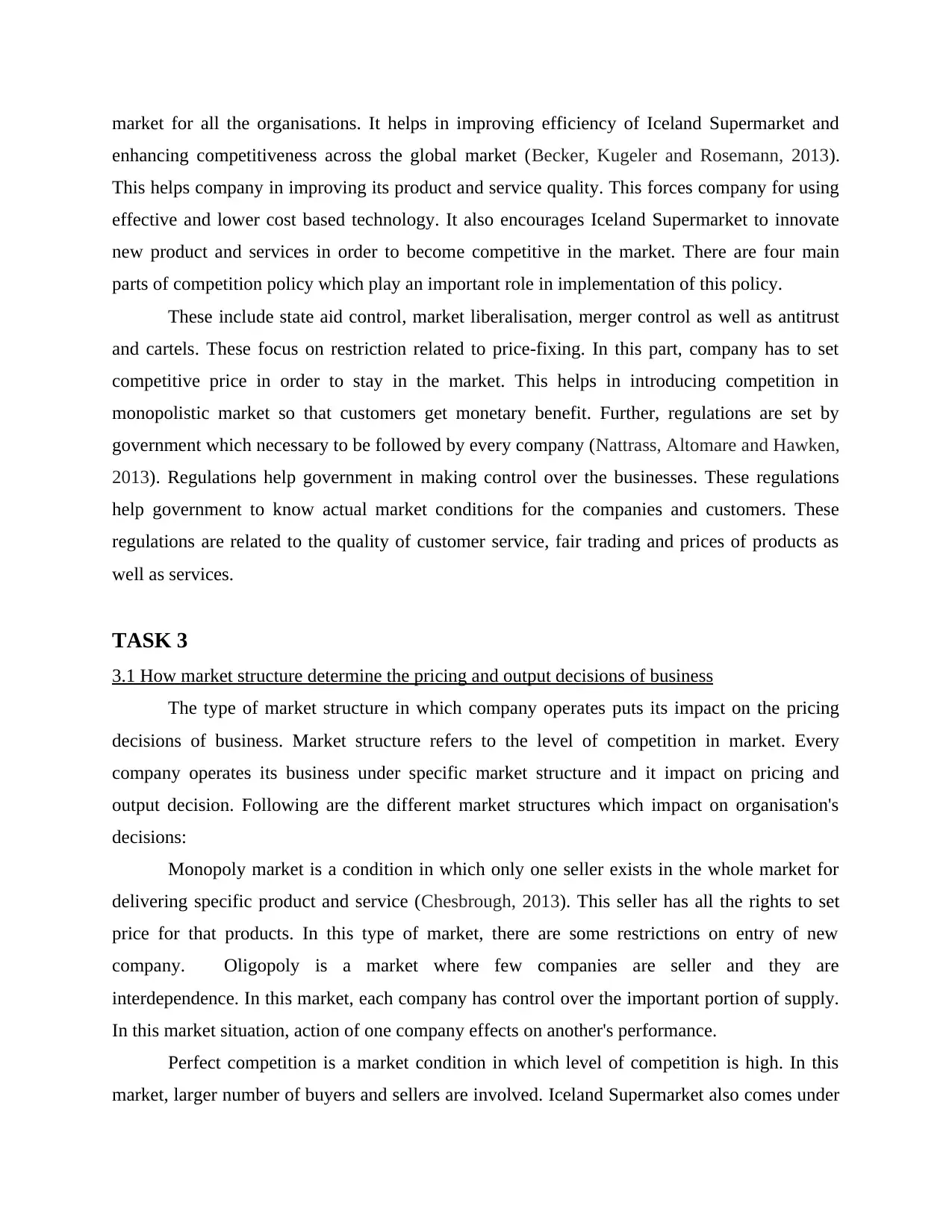
market for all the organisations. It helps in improving efficiency of Iceland Supermarket and
enhancing competitiveness across the global market (Becker, Kugeler and Rosemann, 2013).
This helps company in improving its product and service quality. This forces company for using
effective and lower cost based technology. It also encourages Iceland Supermarket to innovate
new product and services in order to become competitive in the market. There are four main
parts of competition policy which play an important role in implementation of this policy.
These include state aid control, market liberalisation, merger control as well as antitrust
and cartels. These focus on restriction related to price-fixing. In this part, company has to set
competitive price in order to stay in the market. This helps in introducing competition in
monopolistic market so that customers get monetary benefit. Further, regulations are set by
government which necessary to be followed by every company (Nattrass, Altomare and Hawken,
2013). Regulations help government in making control over the businesses. These regulations
help government to know actual market conditions for the companies and customers. These
regulations are related to the quality of customer service, fair trading and prices of products as
well as services.
TASK 3
3.1 How market structure determine the pricing and output decisions of business
The type of market structure in which company operates puts its impact on the pricing
decisions of business. Market structure refers to the level of competition in market. Every
company operates its business under specific market structure and it impact on pricing and
output decision. Following are the different market structures which impact on organisation's
decisions:
Monopoly market is a condition in which only one seller exists in the whole market for
delivering specific product and service (Chesbrough, 2013). This seller has all the rights to set
price for that products. In this type of market, there are some restrictions on entry of new
company. Oligopoly is a market where few companies are seller and they are
interdependence. In this market, each company has control over the important portion of supply.
In this market situation, action of one company effects on another's performance.
Perfect competition is a market condition in which level of competition is high. In this
market, larger number of buyers and sellers are involved. Iceland Supermarket also comes under
enhancing competitiveness across the global market (Becker, Kugeler and Rosemann, 2013).
This helps company in improving its product and service quality. This forces company for using
effective and lower cost based technology. It also encourages Iceland Supermarket to innovate
new product and services in order to become competitive in the market. There are four main
parts of competition policy which play an important role in implementation of this policy.
These include state aid control, market liberalisation, merger control as well as antitrust
and cartels. These focus on restriction related to price-fixing. In this part, company has to set
competitive price in order to stay in the market. This helps in introducing competition in
monopolistic market so that customers get monetary benefit. Further, regulations are set by
government which necessary to be followed by every company (Nattrass, Altomare and Hawken,
2013). Regulations help government in making control over the businesses. These regulations
help government to know actual market conditions for the companies and customers. These
regulations are related to the quality of customer service, fair trading and prices of products as
well as services.
TASK 3
3.1 How market structure determine the pricing and output decisions of business
The type of market structure in which company operates puts its impact on the pricing
decisions of business. Market structure refers to the level of competition in market. Every
company operates its business under specific market structure and it impact on pricing and
output decision. Following are the different market structures which impact on organisation's
decisions:
Monopoly market is a condition in which only one seller exists in the whole market for
delivering specific product and service (Chesbrough, 2013). This seller has all the rights to set
price for that products. In this type of market, there are some restrictions on entry of new
company. Oligopoly is a market where few companies are seller and they are
interdependence. In this market, each company has control over the important portion of supply.
In this market situation, action of one company effects on another's performance.
Perfect competition is a market condition in which level of competition is high. In this
market, larger number of buyers and sellers are involved. Iceland Supermarket also comes under
Paraphrase This Document
Need a fresh take? Get an instant paraphrase of this document with our AI Paraphraser
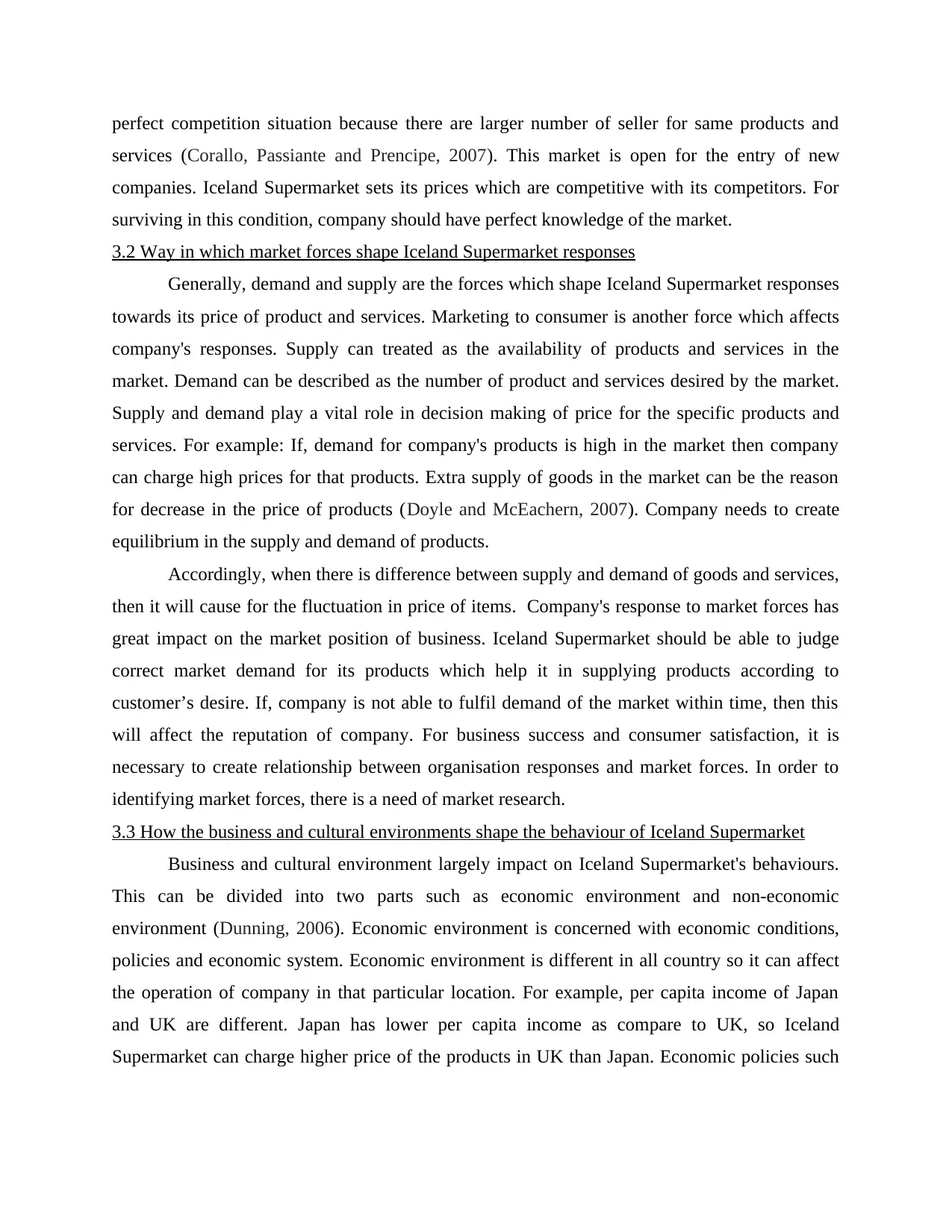
perfect competition situation because there are larger number of seller for same products and
services (Corallo, Passiante and Prencipe, 2007). This market is open for the entry of new
companies. Iceland Supermarket sets its prices which are competitive with its competitors. For
surviving in this condition, company should have perfect knowledge of the market.
3.2 Way in which market forces shape Iceland Supermarket responses
Generally, demand and supply are the forces which shape Iceland Supermarket responses
towards its price of product and services. Marketing to consumer is another force which affects
company's responses. Supply can treated as the availability of products and services in the
market. Demand can be described as the number of product and services desired by the market.
Supply and demand play a vital role in decision making of price for the specific products and
services. For example: If, demand for company's products is high in the market then company
can charge high prices for that products. Extra supply of goods in the market can be the reason
for decrease in the price of products (Doyle and McEachern, 2007). Company needs to create
equilibrium in the supply and demand of products.
Accordingly, when there is difference between supply and demand of goods and services,
then it will cause for the fluctuation in price of items. Company's response to market forces has
great impact on the market position of business. Iceland Supermarket should be able to judge
correct market demand for its products which help it in supplying products according to
customer’s desire. If, company is not able to fulfil demand of the market within time, then this
will affect the reputation of company. For business success and consumer satisfaction, it is
necessary to create relationship between organisation responses and market forces. In order to
identifying market forces, there is a need of market research.
3.3 How the business and cultural environments shape the behaviour of Iceland Supermarket
Business and cultural environment largely impact on Iceland Supermarket's behaviours.
This can be divided into two parts such as economic environment and non-economic
environment (Dunning, 2006). Economic environment is concerned with economic conditions,
policies and economic system. Economic environment is different in all country so it can affect
the operation of company in that particular location. For example, per capita income of Japan
and UK are different. Japan has lower per capita income as compare to UK, so Iceland
Supermarket can charge higher price of the products in UK than Japan. Economic policies such
services (Corallo, Passiante and Prencipe, 2007). This market is open for the entry of new
companies. Iceland Supermarket sets its prices which are competitive with its competitors. For
surviving in this condition, company should have perfect knowledge of the market.
3.2 Way in which market forces shape Iceland Supermarket responses
Generally, demand and supply are the forces which shape Iceland Supermarket responses
towards its price of product and services. Marketing to consumer is another force which affects
company's responses. Supply can treated as the availability of products and services in the
market. Demand can be described as the number of product and services desired by the market.
Supply and demand play a vital role in decision making of price for the specific products and
services. For example: If, demand for company's products is high in the market then company
can charge high prices for that products. Extra supply of goods in the market can be the reason
for decrease in the price of products (Doyle and McEachern, 2007). Company needs to create
equilibrium in the supply and demand of products.
Accordingly, when there is difference between supply and demand of goods and services,
then it will cause for the fluctuation in price of items. Company's response to market forces has
great impact on the market position of business. Iceland Supermarket should be able to judge
correct market demand for its products which help it in supplying products according to
customer’s desire. If, company is not able to fulfil demand of the market within time, then this
will affect the reputation of company. For business success and consumer satisfaction, it is
necessary to create relationship between organisation responses and market forces. In order to
identifying market forces, there is a need of market research.
3.3 How the business and cultural environments shape the behaviour of Iceland Supermarket
Business and cultural environment largely impact on Iceland Supermarket's behaviours.
This can be divided into two parts such as economic environment and non-economic
environment (Dunning, 2006). Economic environment is concerned with economic conditions,
policies and economic system. Economic environment is different in all country so it can affect
the operation of company in that particular location. For example, per capita income of Japan
and UK are different. Japan has lower per capita income as compare to UK, so Iceland
Supermarket can charge higher price of the products in UK than Japan. Economic policies such
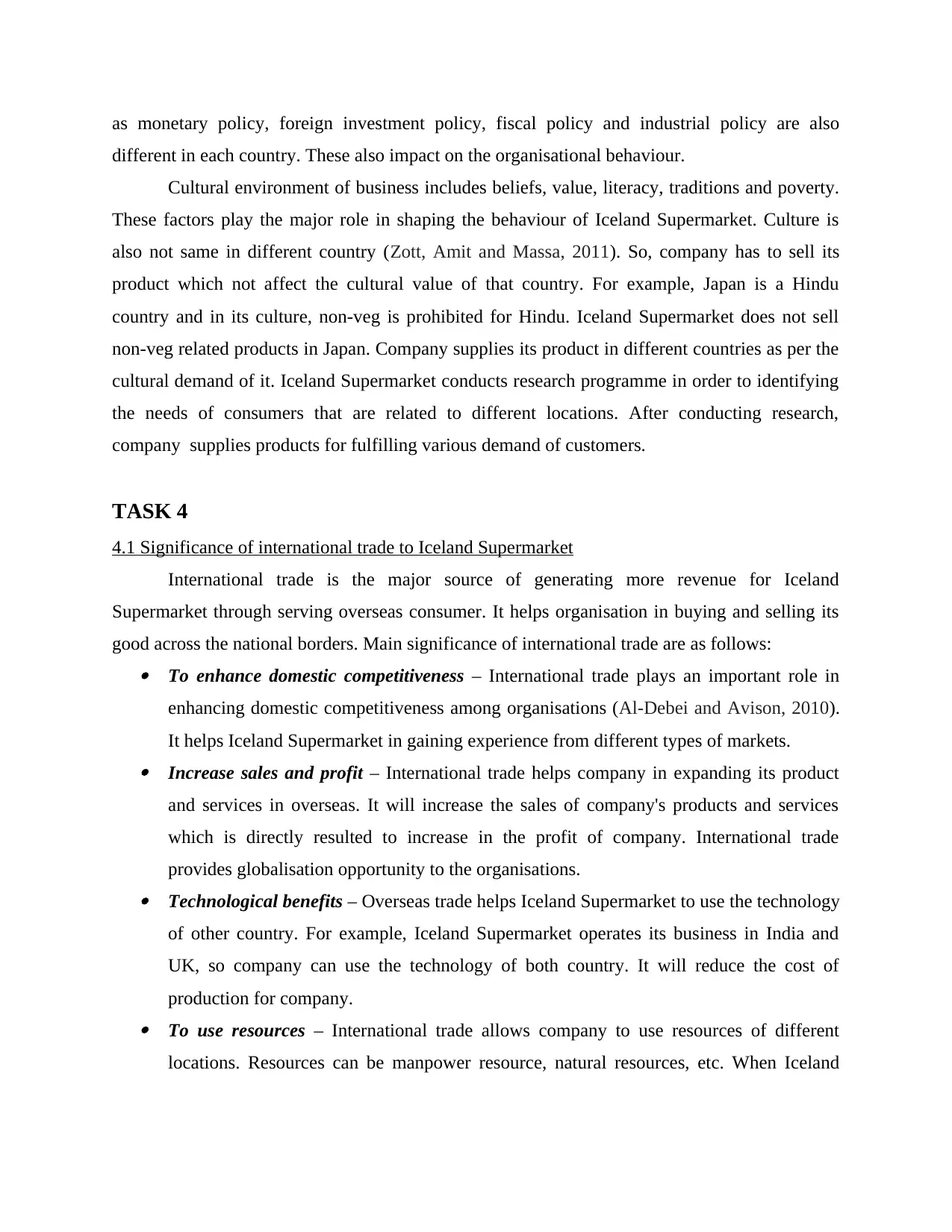
as monetary policy, foreign investment policy, fiscal policy and industrial policy are also
different in each country. These also impact on the organisational behaviour.
Cultural environment of business includes beliefs, value, literacy, traditions and poverty.
These factors play the major role in shaping the behaviour of Iceland Supermarket. Culture is
also not same in different country (Zott, Amit and Massa, 2011). So, company has to sell its
product which not affect the cultural value of that country. For example, Japan is a Hindu
country and in its culture, non-veg is prohibited for Hindu. Iceland Supermarket does not sell
non-veg related products in Japan. Company supplies its product in different countries as per the
cultural demand of it. Iceland Supermarket conducts research programme in order to identifying
the needs of consumers that are related to different locations. After conducting research,
company supplies products for fulfilling various demand of customers.
TASK 4
4.1 Significance of international trade to Iceland Supermarket
International trade is the major source of generating more revenue for Iceland
Supermarket through serving overseas consumer. It helps organisation in buying and selling its
good across the national borders. Main significance of international trade are as follows: To enhance domestic competitiveness – International trade plays an important role in
enhancing domestic competitiveness among organisations (Al-Debei and Avison, 2010).
It helps Iceland Supermarket in gaining experience from different types of markets. Increase sales and profit – International trade helps company in expanding its product
and services in overseas. It will increase the sales of company's products and services
which is directly resulted to increase in the profit of company. International trade
provides globalisation opportunity to the organisations. Technological benefits – Overseas trade helps Iceland Supermarket to use the technology
of other country. For example, Iceland Supermarket operates its business in India and
UK, so company can use the technology of both country. It will reduce the cost of
production for company. To use resources – International trade allows company to use resources of different
locations. Resources can be manpower resource, natural resources, etc. When Iceland
different in each country. These also impact on the organisational behaviour.
Cultural environment of business includes beliefs, value, literacy, traditions and poverty.
These factors play the major role in shaping the behaviour of Iceland Supermarket. Culture is
also not same in different country (Zott, Amit and Massa, 2011). So, company has to sell its
product which not affect the cultural value of that country. For example, Japan is a Hindu
country and in its culture, non-veg is prohibited for Hindu. Iceland Supermarket does not sell
non-veg related products in Japan. Company supplies its product in different countries as per the
cultural demand of it. Iceland Supermarket conducts research programme in order to identifying
the needs of consumers that are related to different locations. After conducting research,
company supplies products for fulfilling various demand of customers.
TASK 4
4.1 Significance of international trade to Iceland Supermarket
International trade is the major source of generating more revenue for Iceland
Supermarket through serving overseas consumer. It helps organisation in buying and selling its
good across the national borders. Main significance of international trade are as follows: To enhance domestic competitiveness – International trade plays an important role in
enhancing domestic competitiveness among organisations (Al-Debei and Avison, 2010).
It helps Iceland Supermarket in gaining experience from different types of markets. Increase sales and profit – International trade helps company in expanding its product
and services in overseas. It will increase the sales of company's products and services
which is directly resulted to increase in the profit of company. International trade
provides globalisation opportunity to the organisations. Technological benefits – Overseas trade helps Iceland Supermarket to use the technology
of other country. For example, Iceland Supermarket operates its business in India and
UK, so company can use the technology of both country. It will reduce the cost of
production for company. To use resources – International trade allows company to use resources of different
locations. Resources can be manpower resource, natural resources, etc. When Iceland
⊘ This is a preview!⊘
Do you want full access?
Subscribe today to unlock all pages.

Trusted by 1+ million students worldwide
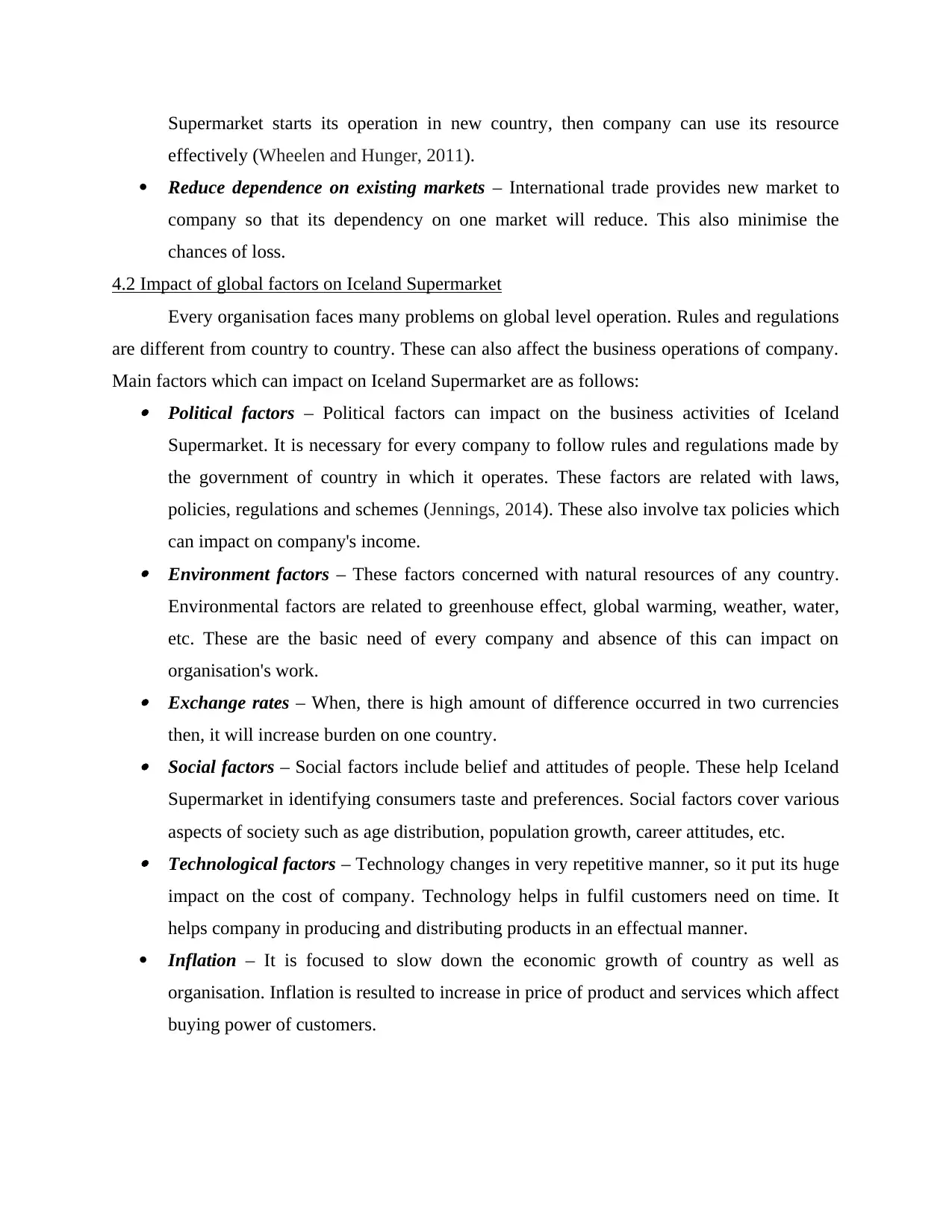
Supermarket starts its operation in new country, then company can use its resource
effectively (Wheelen and Hunger, 2011).
Reduce dependence on existing markets – International trade provides new market to
company so that its dependency on one market will reduce. This also minimise the
chances of loss.
4.2 Impact of global factors on Iceland Supermarket
Every organisation faces many problems on global level operation. Rules and regulations
are different from country to country. These can also affect the business operations of company.
Main factors which can impact on Iceland Supermarket are as follows: Political factors – Political factors can impact on the business activities of Iceland
Supermarket. It is necessary for every company to follow rules and regulations made by
the government of country in which it operates. These factors are related with laws,
policies, regulations and schemes (Jennings, 2014). These also involve tax policies which
can impact on company's income. Environment factors – These factors concerned with natural resources of any country.
Environmental factors are related to greenhouse effect, global warming, weather, water,
etc. These are the basic need of every company and absence of this can impact on
organisation's work. Exchange rates – When, there is high amount of difference occurred in two currencies
then, it will increase burden on one country. Social factors – Social factors include belief and attitudes of people. These help Iceland
Supermarket in identifying consumers taste and preferences. Social factors cover various
aspects of society such as age distribution, population growth, career attitudes, etc. Technological factors – Technology changes in very repetitive manner, so it put its huge
impact on the cost of company. Technology helps in fulfil customers need on time. It
helps company in producing and distributing products in an effectual manner.
Inflation – It is focused to slow down the economic growth of country as well as
organisation. Inflation is resulted to increase in price of product and services which affect
buying power of customers.
effectively (Wheelen and Hunger, 2011).
Reduce dependence on existing markets – International trade provides new market to
company so that its dependency on one market will reduce. This also minimise the
chances of loss.
4.2 Impact of global factors on Iceland Supermarket
Every organisation faces many problems on global level operation. Rules and regulations
are different from country to country. These can also affect the business operations of company.
Main factors which can impact on Iceland Supermarket are as follows: Political factors – Political factors can impact on the business activities of Iceland
Supermarket. It is necessary for every company to follow rules and regulations made by
the government of country in which it operates. These factors are related with laws,
policies, regulations and schemes (Jennings, 2014). These also involve tax policies which
can impact on company's income. Environment factors – These factors concerned with natural resources of any country.
Environmental factors are related to greenhouse effect, global warming, weather, water,
etc. These are the basic need of every company and absence of this can impact on
organisation's work. Exchange rates – When, there is high amount of difference occurred in two currencies
then, it will increase burden on one country. Social factors – Social factors include belief and attitudes of people. These help Iceland
Supermarket in identifying consumers taste and preferences. Social factors cover various
aspects of society such as age distribution, population growth, career attitudes, etc. Technological factors – Technology changes in very repetitive manner, so it put its huge
impact on the cost of company. Technology helps in fulfil customers need on time. It
helps company in producing and distributing products in an effectual manner.
Inflation – It is focused to slow down the economic growth of country as well as
organisation. Inflation is resulted to increase in price of product and services which affect
buying power of customers.
Paraphrase This Document
Need a fresh take? Get an instant paraphrase of this document with our AI Paraphraser
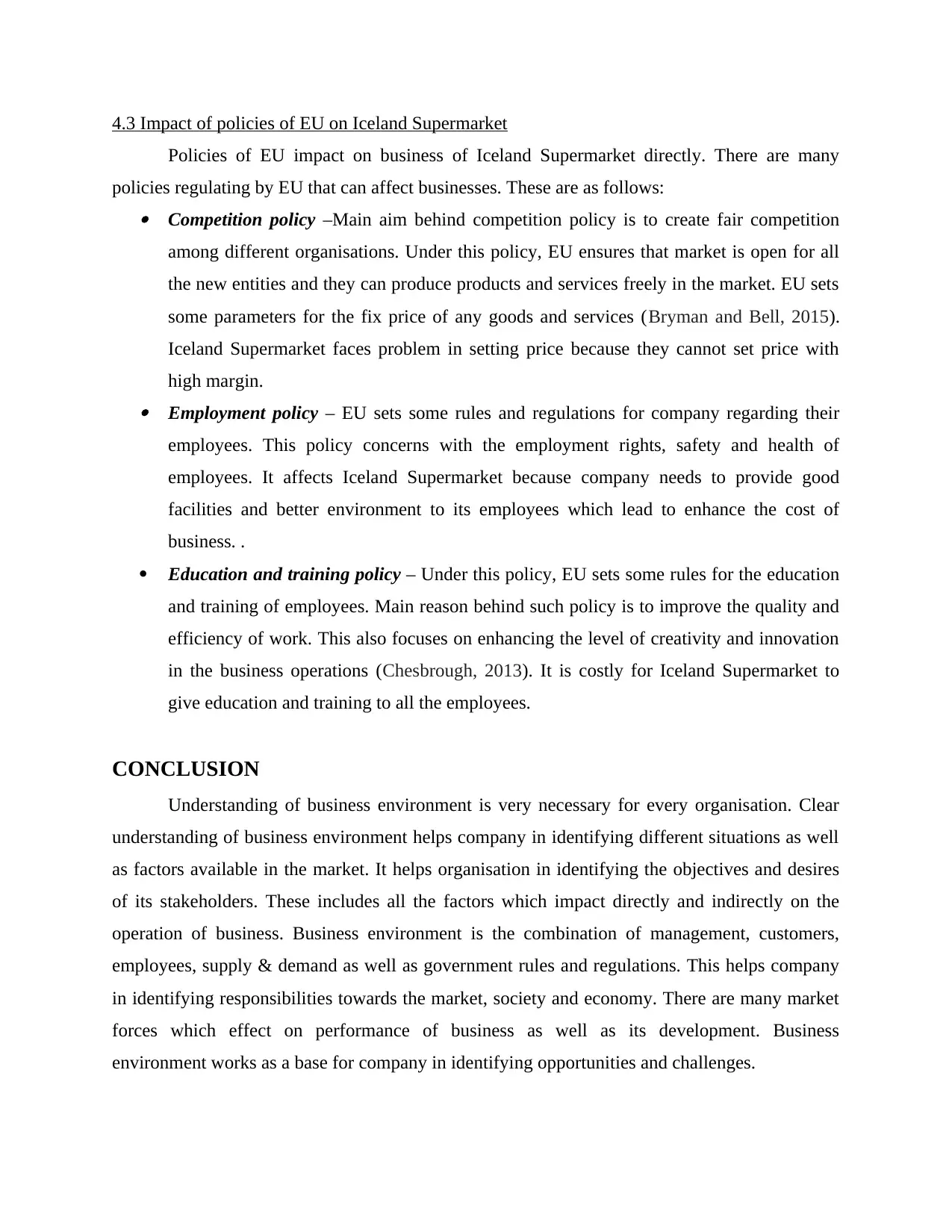
4.3 Impact of policies of EU on Iceland Supermarket
Policies of EU impact on business of Iceland Supermarket directly. There are many
policies regulating by EU that can affect businesses. These are as follows: Competition policy –Main aim behind competition policy is to create fair competition
among different organisations. Under this policy, EU ensures that market is open for all
the new entities and they can produce products and services freely in the market. EU sets
some parameters for the fix price of any goods and services (Bryman and Bell, 2015).
Iceland Supermarket faces problem in setting price because they cannot set price with
high margin. Employment policy – EU sets some rules and regulations for company regarding their
employees. This policy concerns with the employment rights, safety and health of
employees. It affects Iceland Supermarket because company needs to provide good
facilities and better environment to its employees which lead to enhance the cost of
business. .
Education and training policy – Under this policy, EU sets some rules for the education
and training of employees. Main reason behind such policy is to improve the quality and
efficiency of work. This also focuses on enhancing the level of creativity and innovation
in the business operations (Chesbrough, 2013). It is costly for Iceland Supermarket to
give education and training to all the employees.
CONCLUSION
Understanding of business environment is very necessary for every organisation. Clear
understanding of business environment helps company in identifying different situations as well
as factors available in the market. It helps organisation in identifying the objectives and desires
of its stakeholders. These includes all the factors which impact directly and indirectly on the
operation of business. Business environment is the combination of management, customers,
employees, supply & demand as well as government rules and regulations. This helps company
in identifying responsibilities towards the market, society and economy. There are many market
forces which effect on performance of business as well as its development. Business
environment works as a base for company in identifying opportunities and challenges.
Policies of EU impact on business of Iceland Supermarket directly. There are many
policies regulating by EU that can affect businesses. These are as follows: Competition policy –Main aim behind competition policy is to create fair competition
among different organisations. Under this policy, EU ensures that market is open for all
the new entities and they can produce products and services freely in the market. EU sets
some parameters for the fix price of any goods and services (Bryman and Bell, 2015).
Iceland Supermarket faces problem in setting price because they cannot set price with
high margin. Employment policy – EU sets some rules and regulations for company regarding their
employees. This policy concerns with the employment rights, safety and health of
employees. It affects Iceland Supermarket because company needs to provide good
facilities and better environment to its employees which lead to enhance the cost of
business. .
Education and training policy – Under this policy, EU sets some rules for the education
and training of employees. Main reason behind such policy is to improve the quality and
efficiency of work. This also focuses on enhancing the level of creativity and innovation
in the business operations (Chesbrough, 2013). It is costly for Iceland Supermarket to
give education and training to all the employees.
CONCLUSION
Understanding of business environment is very necessary for every organisation. Clear
understanding of business environment helps company in identifying different situations as well
as factors available in the market. It helps organisation in identifying the objectives and desires
of its stakeholders. These includes all the factors which impact directly and indirectly on the
operation of business. Business environment is the combination of management, customers,
employees, supply & demand as well as government rules and regulations. This helps company
in identifying responsibilities towards the market, society and economy. There are many market
forces which effect on performance of business as well as its development. Business
environment works as a base for company in identifying opportunities and challenges.
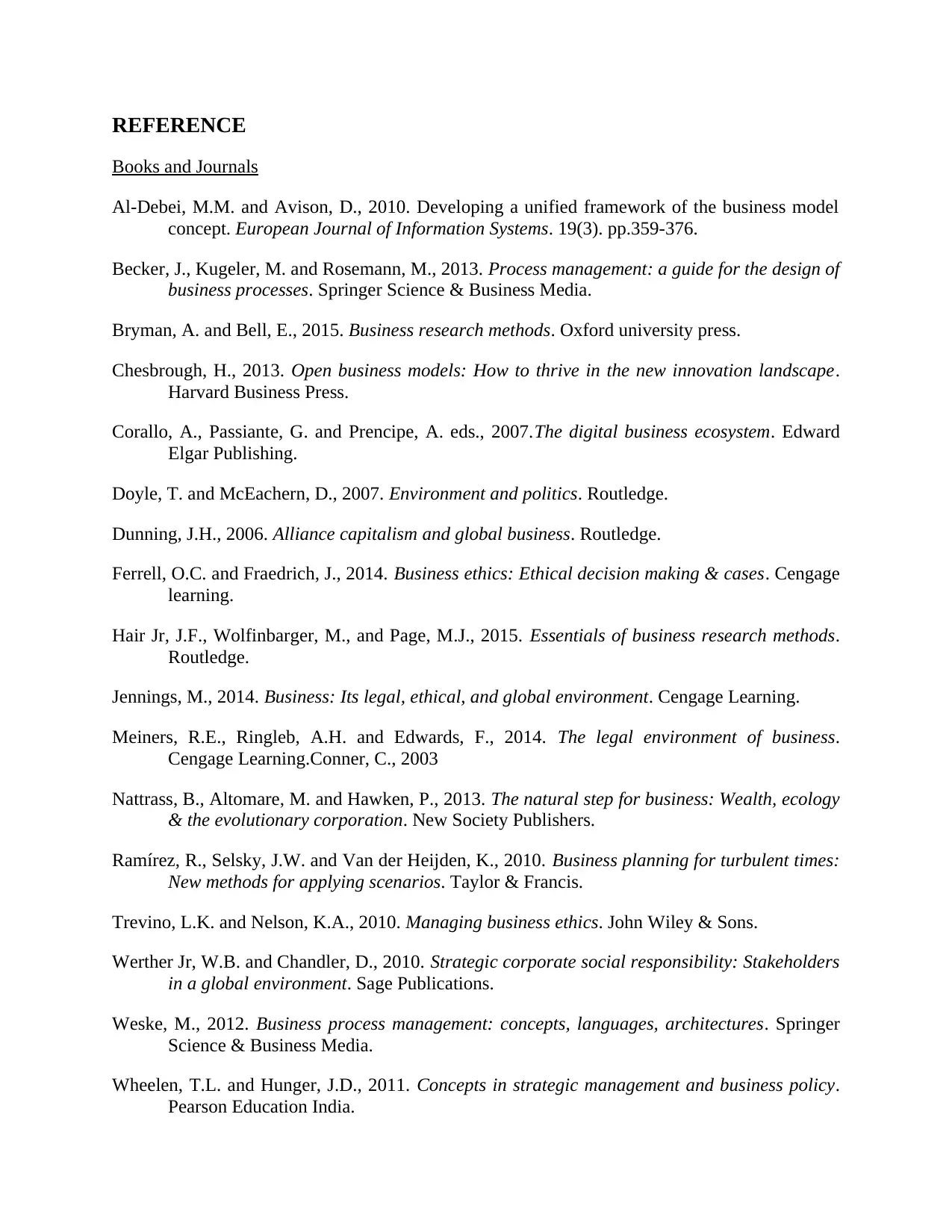
REFERENCE
Books and Journals
Al-Debei, M.M. and Avison, D., 2010. Developing a unified framework of the business model
concept. European Journal of Information Systems. 19(3). pp.359-376.
Becker, J., Kugeler, M. and Rosemann, M., 2013. Process management: a guide for the design of
business processes. Springer Science & Business Media.
Bryman, A. and Bell, E., 2015. Business research methods. Oxford university press.
Chesbrough, H., 2013. Open business models: How to thrive in the new innovation landscape.
Harvard Business Press.
Corallo, A., Passiante, G. and Prencipe, A. eds., 2007.The digital business ecosystem. Edward
Elgar Publishing.
Doyle, T. and McEachern, D., 2007. Environment and politics. Routledge.
Dunning, J.H., 2006. Alliance capitalism and global business. Routledge.
Ferrell, O.C. and Fraedrich, J., 2014. Business ethics: Ethical decision making & cases. Cengage
learning.
Hair Jr, J.F., Wolfinbarger, M., and Page, M.J., 2015. Essentials of business research methods.
Routledge.
Jennings, M., 2014. Business: Its legal, ethical, and global environment. Cengage Learning.
Meiners, R.E., Ringleb, A.H. and Edwards, F., 2014. The legal environment of business.
Cengage Learning.Conner, C., 2003
Nattrass, B., Altomare, M. and Hawken, P., 2013. The natural step for business: Wealth, ecology
& the evolutionary corporation. New Society Publishers.
Ramírez, R., Selsky, J.W. and Van der Heijden, K., 2010. Business planning for turbulent times:
New methods for applying scenarios. Taylor & Francis.
Trevino, L.K. and Nelson, K.A., 2010. Managing business ethics. John Wiley & Sons.
Werther Jr, W.B. and Chandler, D., 2010. Strategic corporate social responsibility: Stakeholders
in a global environment. Sage Publications.
Weske, M., 2012. Business process management: concepts, languages, architectures. Springer
Science & Business Media.
Wheelen, T.L. and Hunger, J.D., 2011. Concepts in strategic management and business policy.
Pearson Education India.
Books and Journals
Al-Debei, M.M. and Avison, D., 2010. Developing a unified framework of the business model
concept. European Journal of Information Systems. 19(3). pp.359-376.
Becker, J., Kugeler, M. and Rosemann, M., 2013. Process management: a guide for the design of
business processes. Springer Science & Business Media.
Bryman, A. and Bell, E., 2015. Business research methods. Oxford university press.
Chesbrough, H., 2013. Open business models: How to thrive in the new innovation landscape.
Harvard Business Press.
Corallo, A., Passiante, G. and Prencipe, A. eds., 2007.The digital business ecosystem. Edward
Elgar Publishing.
Doyle, T. and McEachern, D., 2007. Environment and politics. Routledge.
Dunning, J.H., 2006. Alliance capitalism and global business. Routledge.
Ferrell, O.C. and Fraedrich, J., 2014. Business ethics: Ethical decision making & cases. Cengage
learning.
Hair Jr, J.F., Wolfinbarger, M., and Page, M.J., 2015. Essentials of business research methods.
Routledge.
Jennings, M., 2014. Business: Its legal, ethical, and global environment. Cengage Learning.
Meiners, R.E., Ringleb, A.H. and Edwards, F., 2014. The legal environment of business.
Cengage Learning.Conner, C., 2003
Nattrass, B., Altomare, M. and Hawken, P., 2013. The natural step for business: Wealth, ecology
& the evolutionary corporation. New Society Publishers.
Ramírez, R., Selsky, J.W. and Van der Heijden, K., 2010. Business planning for turbulent times:
New methods for applying scenarios. Taylor & Francis.
Trevino, L.K. and Nelson, K.A., 2010. Managing business ethics. John Wiley & Sons.
Werther Jr, W.B. and Chandler, D., 2010. Strategic corporate social responsibility: Stakeholders
in a global environment. Sage Publications.
Weske, M., 2012. Business process management: concepts, languages, architectures. Springer
Science & Business Media.
Wheelen, T.L. and Hunger, J.D., 2011. Concepts in strategic management and business policy.
Pearson Education India.
⊘ This is a preview!⊘
Do you want full access?
Subscribe today to unlock all pages.

Trusted by 1+ million students worldwide
1 out of 13
Related Documents
Your All-in-One AI-Powered Toolkit for Academic Success.
+13062052269
info@desklib.com
Available 24*7 on WhatsApp / Email
![[object Object]](/_next/static/media/star-bottom.7253800d.svg)
Unlock your academic potential
Copyright © 2020–2025 A2Z Services. All Rights Reserved. Developed and managed by ZUCOL.





